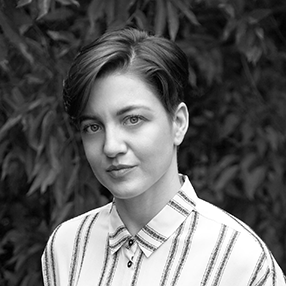has twenty-five floors. Its letters hum
to pedestrians in large metal serif.
From Floor 19, you can see offices across
the street, suits dimming their desk lamps.
Like all hotel rooms, this one’s asking you
to cry. You wait until you’ve left the large bed,
the elevator dings open and you’re on West 46th
passing long October coats. Only there, away
from the cornerless dark where your lover sleeps,
away from the room’s disarming neutrality,
can you soften into what’s next. The relief
of dropping sad water on pavement used
to catching it. How steady the scaffolding.
How predictable its right angles. Under them,
the curve of your head gains balance.
Feathers continue their low pivoting
in sudden storm. On Floor 19, your lover’s eyelids
and shoulders open, the glass wall bends
to his length. Last night, while under it,
you could taste plaster, steel, ascension of thighs,
their blueprint drawn for reascending. Under him,
you understood there’s no safe engineering
for this much want. What will you lose, pivoting
on 10th Ave? If you could tell him no, you wouldn’t.
Copyright © 2024 by K. Iver. Originally published in Poem-a-Day on July 18, 2024, by the Academy of American Poets.
“The sentence ‘Like all hotel rooms, this one’s asking you / to cry’ came to me during my stay at The Gotham Hotel. Unable to sleep, I wrote it down as a way of listening to desire, its hopes and warnings. The ‘he’ is trans, and that’s important in a text that highlights building as both a noun and a verb. The number of lines, including the bleeding title, matches the hotel’s twenty-five floors. Exteriors are emphasized as sentence subjects—coats and feathers rather than people and pigeons—in a movement that I hope meets the value of Rimbaud’s ‘derangement of the senses,’ which is how I experience desire.”
—K. Iver

